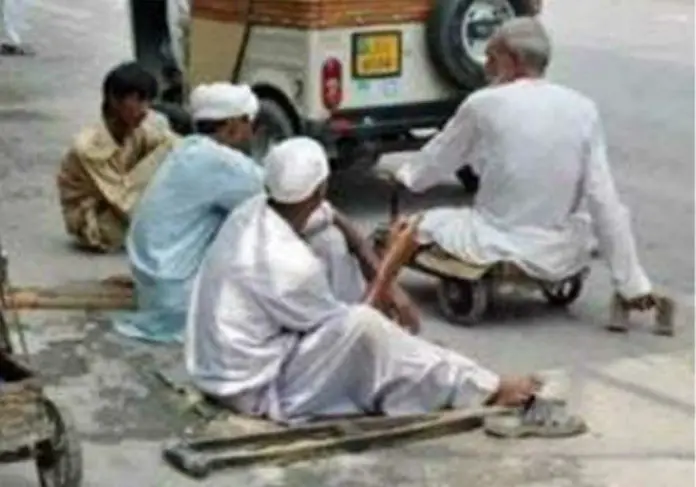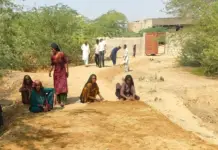Beggary in Pakistan is a deeply rooted socio-economic issue that links with various aspects of society, including poverty, unemployment, and organized crime. According to Asian Human Rights Commission (AHRC) there are about 25 million professional beggars in Pakistan, which represents a significant portion of the population and highlights the urgency of addressing this issue. 2.5% to 11 % of the total population is in the profession of beggary. Almost 1.2 million children are estimated to have been on the streets of major urban cities in the country. There is an interesting point about the income of beggars in Pakistan, which highlights the varying economic realities within the country. The range of PKR 1500 to 6000 per day suggests significant daily earnings, particularly in a country where the average daily wage can be much lower for many formal sectors. This figure can spark discussions on several fronts including the socioeconomic factors driving people to beg, the effectiveness of social safety nets, and public perceptions of poverty and begging in Pakistani society.
In Pakistan, traffic signals are commonly known to be spots where beggars gather. This pattern is partly due to the high visibility and the captive audience of motorists and pedestrians stopped at these lights, making it one of the preferred locations for begging. These areas provide beggars with a steady stream of potential donors within a confined space, enhancing their chances of receiving alms.
The presence of beggars at traffic signals can be attributed to several factors, including the strategic choice of high-traffic areas by individuals or by organized begging syndicates. Beggars often operate under the control of mafias that manage specific territories, including traffic junctions. These mafias orchestrate where and when beggars work, sometimes rotating them through various lucrative spots to maximize earnings.
Addressing the prevalence of beggars at traffic signals involves multifaceted strategies, encompassing law enforcement, social welfare programs, and public awareness campaigns aimed at discouraging roadside giving, which can perpetuate the cycle of dependency and empower criminal networks involved in organized begging.
The phenomenon of beggary in Pakistan is not just a simple act of seeking alms; it’s often controlled by organized crime syndicates known as beggar mafias. These groups exploit vulnerable populations, including children, the disabled, and the impoverished, manipulating them into begging through coercion and sometimes mutilation. The beggars often operate under strict hierarchies and are forced to surrender their earnings to these mafias.
The beggary issue is exacerbated by the country’s economic conditions. Despite numerous laws against begging, enforcement is weak, and many people see begging as an easier alternative to low-wage labor. This situation is fueled by the high levels of poverty in the country, where a significant proportion of the population cannot meet basic needs and thus turns to beg.
Efforts to combat this problem have included legislation and court rulings aimed at eradicating professional beggary and providing better support for the destitute. For instance, laws provide for imprisonment for begging and mandate government action to discourage this practice through social welfare measures.
Moreover, begging in Pakistan is linked to the country’s high levels of charity, including practices like Zakat and Sadqa, which are integral to Islamic tradition. Unfortunately, this well-meaning generosity also inadvertently supports the beggary economy, as donors often give alms without considering whether they are encouraging dependency or crime.
Strategies proposed to tackle the issue comprehensively include enforcing anti-beggary laws more strictly, enhancing social welfare programs, creating job opportunities, and improving access to education and skills training. There’s also a need for public awareness campaigns to inform potential donors about the impacts of their charity and encourage more productive forms of assistance.
Controlling begging in Pakistan requires a multifaceted approach that addresses both the symptoms and the root causes of the issue. Firstly, enforcement of existing laws against organized begging must be strengthened. Although laws are in place, their implementation has often been lax. Increasing police vigilance at known hotspots, such as traffic signals and public spaces, and targeting beggar mafias can reduce the visibility and viability of begging as a profession. The judiciary can also play a critical role by ensuring that those who exploit beggars are prosecuted rigorously.
Secondly, enhancing social welfare programs is vital. The government, in partnership with non-governmental organizations, can improve and expand services that address poverty directly, such as providing shelters, food, healthcare, and rehabilitation programs. These services can help reduce the immediate need for begging by offering alternative means of support. Education plays a crucial role in this regard; by ensuring that children, especially those from vulnerable groups, have access to quality education, they are less likely to be drawn into begging. Vocational training for adults can similarly offer pathways out of poverty that do not involve begging.
Finally, public awareness and community engagement are essential to changing the societal attitudes towards begging. Campaigns that educate the public on the realities of organized begging and encourage more constructive forms of charity can help diminish the income beggars receive directly on the streets. Encouraging people to donate to established charities rather than giving money to street beggars can help ensure that contributions are used effectively and reach those genuinely in need. Additionally, these campaigns can foster a more supportive environment for former beggars reintegrating into society.







